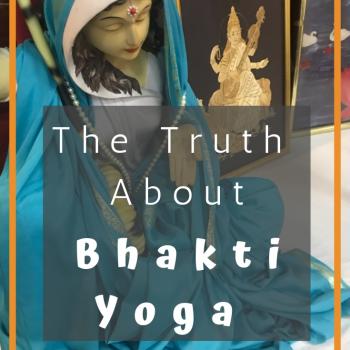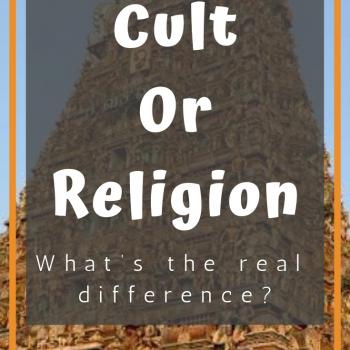This is a subject that came up on my Facebook page recently. Do we need to have a teacher to guide our spiritual progress in Hinduism?
I can definitely see how a guru or teacher would be very valuable for many people, at least for part of the journey, but I also think there are other ways to go about it. One of the things I like about Hinduism is that you do not need an intermediary between yourself and God. Because the divine is within you, you are always capable of accessing it directly.
On the other hand, a guide can be enormously helpful. Krishnachandra Dasan on the Facebook page made quite a good case for the need for a teacher:
It could be perceived as you put it [referencing when I said that Krishna says in the Gita that he accepts any offering made with devotion, whether a leaf, a flower, or a drop of water], and yes, as Krishna says, there is no diminishment of any act performed in devotion, however, He also says in verse 18:66, to “Surrender unto Him and He will liberate you”! So, in the same tradition, if one really wants to achieve the fruits of Aradhanam, (which is ultimately moksha, according to all the Vedic sastra’s), then it is recommended that one seeks out a bona fide Acharya, (who represents the traditions and heritage of a Vedic lineage, also known as a ‘Sampradaya’) and undergo the appropriate initiation according to which ever deity / Agama they wish to follow, otherwise, it is described to be like “licking the outside of a honey jar”, going through the motions, but not having access to the nectar and nutrition inside!
It is also stated:
sruti-smriti-puranadi-
pancaratra-vidhim vina
aikantiki harer bhaktir
utpatayaiva kalpate
“Devotional service to the Lord that ignores the institutes of the authorized Vedic literatures like the Upanishads, Puranas and Narada-pancaratra is simply an unnecessary disturbance in society.”
Therefore, the first port of call for anyone who follows Sanatana-dharma, is to seek out a bona fide Acharya and receive the necessary mantras, guidance, knowledge and training from them in order to achieve the ultimate goal of life, which is to understand the self and become free from Samsara, which is the point of all Hindu / Indian based traditions:
“One cannot learn about the Ultimate Truth from the Scriptures through personal reading and self-interpretation — the teaching must come from an authority. In matters of health one does not consult a doctor who is self taught, one goes to a specialist who has studied
in a recognized school of medicine. In the same manner in order to understand the Ultimate Truth as it really is, one goes to a properly qualified Acharya-purusha”!
Ref: http://yajurvedaustralasia-resources.info/wp-content/uploads/2010/10/NeedforanAcharya.pdf
This statement is reaffirmed by many quotes from the sastras:
yasya deve para bhaktir
yatha deve tatha gurau
tasyaite kathita hy arthah
prakasante mahatmanah
“Only unto those great souls who have implicit faith in both the Lord and the spiritual master are all the imports of Vedic knowledge automatically revealed”! (Ref: Svetasvatara Upanishad, 6.23).
tad-vijnanartham sa gurum evabhigacchet
samit-panih srotriyam brahma-nishtham
“If one is actually serious about understanding supernatural, transcendental subject matters, one must approach a bona fide spiritual master”! (Ref: Mundaka Upanishad 1.2.12).
The Viṣṇu Purāṇa (3.8.9) states: “The Supreme Personality of Godhead, Lord Viṣhṇu, is worshiped by the proper execution of prescribed duties in the system of varṇa and āśrama. There is no other way to satisfy the Supreme Personality of Godhead. One must be situated in the institution of the four varṇas and āśramas”!
Without the assistance of an Acharya, one cannot be ‘properly’ situated in VarnAshram and therefore, as it is stated above, one cannot (ultimately) please the Lord, which is the goal of ‘Bhakti’!
There is a whole chapter in the Srimad Bhagavatam, where Krishna explains to Uddhava the process of worshiping an icon / deity and therein He emphatically states that one should be ‘twice-born’, i.e. initiated and follow the prescribed duties set out in the Vedic literatures:
SB 11.27.6: The Supreme Personality of Godhead said: My dear Uddhava, there is no end to the innumerable Vedic prescriptions for executing Deity worship; so I shall explain this topic to you briefly, one step at a time.
SB 11.27.7: One should carefully worship Me by selecting one of the three methods by which I receive sacrifice: Vedic, tantric or mixed.
SB 11.27.8: Now please listen faithfully as I explain exactly how a person who has achieved twice-born status through the relevant Vedic prescriptions should worship Me with devotion.
SB 11.27.9: A twice-born person should worship Me, his worshipable Lord, without duplicity, offering appropriate paraphernalia in loving devotion to My Deity form or to a form of Me appearing upon the ground, in fire, in the sun, in water or within the worshiper’s own heart.
SB 11.27.10: One should first purify his body by cleansing his teeth and bathing. Then one should perform a second cleansing by smearing the body with earth and chanting both Vedic and tantric mantras.
SB 11.27.11: Fixing the mind on Me, one should worship Me by his various prescribed duties, such as chanting the Gāyatrī mantra at the three junctures of the day. Such performances are enjoined by the Vedas and purify the worshiper of reactions to fruitive activities.
(To me “Surrender unto Him and He will liberate you” doesn’t mean seek out a guru, it means surrender to Krishna in your heart. Some of these other quotes can also mean you studying the scriptures, not necessarily needing a teacher to tell you what they mean).
It’s hard for me to know how much someone with no background in Hinduism could learn and pick up on her own. I can imagine one could learn a lot from books and the Internet, but it would help a lot to have a wise man interpreting and guiding at least at first. On the other hand, there are stories of people spontaneously becoming enlightened because they sense the truth and follow it (most likely these people had many previous lifetimes of study and learning).
I had the guidance of a guru for a period of time, so I did have the help until my mind was developed enough to comprehend the fullness of truth.
I’m thinking now that perhaps it is a natural development for someone who didn’t grow up with Hinduism to start to learn the basics from books and the Internet and keep an eye out for an appropriate guru. It’s good to take one’s time and find just the right teacher.
Eventually I do think that you can grow beyond the need for a guru.
You have the truth within you and you are capable of accessing it.
My own background is informing this opinion. I am very wary of gurus and have difficulty trusting anyone outside myself to guide me spiritually. I’ve felt burned before. However, I also feel confident in my ability to guide my own soul towards enlightenment. I feel the divine spark within me and I am happy for it to guide me.














